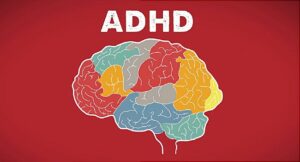Attention Deficit Hyperactivity Disorder (ADHD) and Obsessive Compulsive Disorder (OCD) are two of the most common mental health diagnoses among adults. What many do not know, however, is that they can often occur together. Having both ADHD and OCD can be an overwhelming experience as it can cause a range of physical, emotional, and cognitive issues. In this blog post, we will explore how these two conditions overlap in adults and look at ways to manage them. We will also discuss the unique challenges associated with ADHD and OCD co-occurring in adulthood so that individuals can better understand their situation and learn how to best cope.
Contents
What is ADHD?

There are two types of ADHD: inattentive and hyperactive-impulsive. People with inattentive ADHD may seem to not be paying attention, but they actually can’t focus on anything for very long. Those with hyperactive-impulsive ADHD are always moving and can’t sit still. They may also talk a lot. Adults with either type of ADHD often have problems at work, at home, and in relationships.
ADHD is caused by differences in the brain. Scientists aren’t sure exactly how these differences happen, but they believe that genetics plays a role. ADHD often runs in families. Brain injuries, exposure to toxins, and premature birth have also been linked to the condition.
What is OCD?
OCD is a mental disorder that causes repetitive thoughts or behaviors. People with OCD may have obsessive thoughts about germs or contamination. They may wash their hands frequently or avoid touching door handles. They may also arrange objects in a certain way or need to perform rituals before leaving the house.
OCD is a type of anxiety disorder, and it can have a significant impact on daily life. Treatment usually involves medication and cognitive behavior therapy.
Are There Any Signs of ADHD and OCD Together In Adults?

Several signs may indicate that a person has both ADHD and OCD.
Some of the signs of ADHD and OCD together in adults may include:
Having difficulty maintaining concentration, even while engaging in activities they enjoy: One of the most common signs of ADHD is difficulty staying focused and paying attention. With OCD, the person may also struggle to keep their focus on tasks or activities because they are continually worrying about details or perfectionism.
Feeling overwhelmed by choices: An adult with both ADHD and OCD may be overwhelmed when presented with a range of options or decisions, as they can’t decide which one is the right choice.
Having difficulty making decisions: Adults with both conditions may find it hard to make decisions, even when it comes to simple daily tasks like what to eat for breakfast or what clothes to wear. They may also be indecisive when it comes to bigger decisions like career paths.
Being easily distracted by intrusive thoughts: People with both ADHD and OCD are more susceptible to intrusive thoughts that can disrupt their focus and cause them distress. They may have difficulty organizing their thoughts, and these distractions can cause them to feel overwhelmed and anxious.
Engaging in compulsive behaviors: Adults with both ADHD and OCD may find themselves engaging in compulsions such as washing their hands excessively, checking locks multiple times, or constantly rearranging objects to reduce anxiety.
Experiencing difficulty sleeping: People with both ADHD and OCD may have trouble falling asleep or staying asleep due to intrusive thoughts, rumination, and worries about perfectionism. They may also struggle to stay on a consistent sleep schedule.
Having difficulty in social situations: Adults with both ADHD and OCD may have difficulty interacting with others, as they can easily become overwhelmed in social situations. They may also find it hard to make decisions when it comes to initiating conversations or participating in activities.
These are just a few of the signs that may indicate someone has both ADHD and OCD. It’s important to note, however, that not everyone with these conditions will experience all of these symptoms.
How Do ADHD and OCD Impact Each Other In Adults?
ADHD and OCD often occur together in adults. While the symptoms of each disorder can impact the other, there are some ways in which they specifically affect one another.
There are some specific ways in which ADHD and OCD impact each other in adults. People with both disorders may have a harder time:
Paying Attention: Other than a diagnosis of both ADHD and OCD, difficulty paying attention can also be a result of the two disorders. People with both disorders may have trouble focusing on tasks and staying organized.
Managing Time: People with ADHD and OCD may find it difficult to manage their time and remember to do important tasks or meetings. This can lead to anxiety, frustration, and irritability.
Maintaining Relationships: People with ADHD and OCD may struggle to connect with others due to their difficulty focusing and organizing thoughts. They may also be less likely to socially engage or take part in activities due to their symptoms.
Focusing on tasks: Another symptom of both ADHD and OCD is difficulty focusing on tasks or completing tasks promptly. This can lead to procrastination, anxiety, and frustration for the individual.
Overall, people with both ADHD and OCD may struggle with certain aspects of their lives more than those without either disorder. It is important to seek help from a mental health professional if you are experiencing symptoms of either disorder. With proper treatment, it is possible to manage both ADHD and OCD successfully.
Tips For Managing Both ADHD and OCD
ADHD and OCD together can be a difficult combination to manage, but some tips can help. Some of these are:
Make a Plan
One of the first steps to managing ADHD and OCD is to make a plan. This includes setting realistic goals and working out how you are going to achieve them. It also means making sure that you have the resources and support that you need to reach your goals.
Structure Your Day
Having structure and routine in your day can help you manage both ADHD and OCD, as it can help reduce stress and anxiety. Try to stick to a set routine every day, including regular meals, physical activity, relaxation, studying or work tasks, etc.
Focus on One Task at a Time
For someone with both ADHD and OCD, it can be difficult to stay focused on one task for extended periods. To help with this try breaking down tasks into smaller steps so it is easier for your mind to stay focused on the task at hand. Also, try setting yourself small rewards for completing each step of the task or project. This will help motivate you further.
Get Regular Exercise
Regular exercise has been proven to help with both ADHD and OCD symptoms as it helps release endorphins which can improve mood levels. Aim for 30 minutes of exercise several times a week, this could be anything from running or jogging, swimming, or doing some form of martial arts.
Medication
In some cases, medication may be recommended to help manage both ADHD and OCD. If this is the case for you, it is important to make sure that you follow the instructions from your doctor or healthcare professional carefully.
Some people find that talk therapy can also be beneficial in helping to manage both ADHD and OCD. Cognitive Behavioral Therapy (CBT) is one type of talk therapy that can help you learn how to better manage your symptoms.
Make Safe Space
One way to manage both ADHD and OCD is to create a space that is safe and comfortable for you. This could be a room in your home or somewhere else where you can go to relax and focus on yourself. Make sure it has everything you need to stay organized and focused, such as stationery, books, or other items.
These are just some of the tips that can help with managing both ADHD and OCD. It’s important to remember that everyone is different, so what works for one person may not work for another. However, it’s important to find the strategies that work best for you and stick with them.
Conclusion
ADHD and OCD can be difficult conditions to manage on their own, but when they exist together, it can make life even more challenging. Fortunately, with the right treatment and support from friends and family, adults living with both of these conditions can learn how to cope and live successful lives. If you or someone you know is living with ADHD and OCD together in adulthood, consider reaching out for help so that you can get started down the path toward recovery.
For more information and guidance, please contact MantraCare. OCD is a mental health disorder characterized by obsessions and compulsions. If you have any queries regarding Online OCD Counseling experienced therapists at MantraCare can help: Book a trial OCD therapy session.


